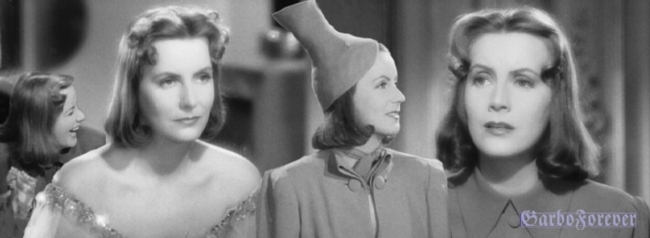
NINOTCHKA
|
|
| ALTERNATE TITLES |
|
Ninotschka (GERMANY/AUSTRIA)
Ninoczka (POLAND)
|
FILM SCENES |
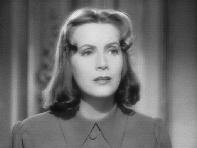 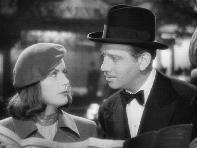 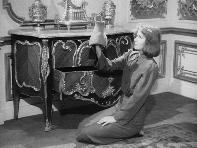 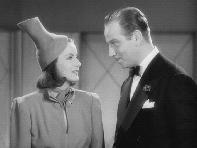
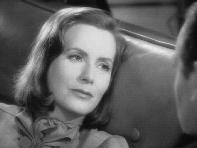 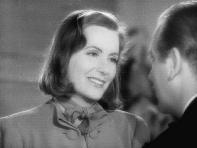 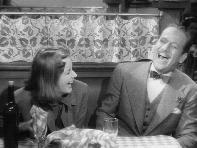 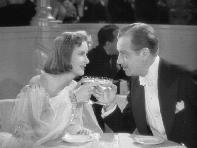
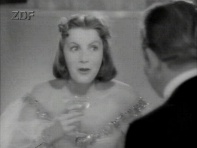 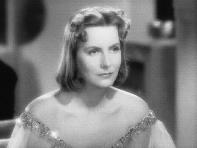 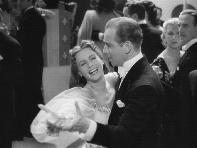 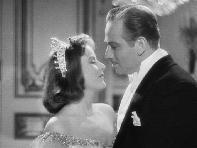
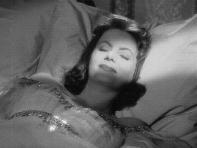 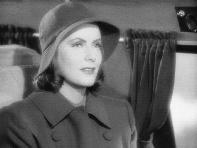 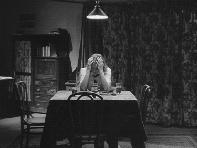 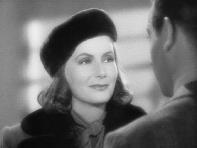
|
COMPANY |
Metro-Goldwyn-Mayer (MGM)
|
CREDITS |
Produced and Directed by Ernst Lubitsch.
Screenplay by Charles Brackett, Billy Wilder and Walter Reisch.
Based on the original story by Melchior Lengyel.
Photographed by William Daniels.
Edited by Gene Ruggiero.
Unit manager: Frank Messinger.
Assistant Director: Horace Hough.
Musical score by Werner R. Heymann.
Recording supervised by Douglas Shearer.
Art Direction by Cedric Gibbons.
Associate: Randall Duell.
Set Decorations by Edwin B. Willis.
Gowns by Adrian.
Make-up created by Jack Daum.
|
TECHNICAL SPECS |
110 Minutes
MGM Production: 1100
|
CAST |
Greta Garbo - Nina Yakushova 'Ninotchka' Ivanoff
Melvyn Douglas - Léon, Comte d'Agoult
Ina Claire - Grand Duchess Swana
Bela Lugosi - Kommissar Razinin
|
FILM POSTER |
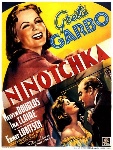
More HERE!
|
GARBO'S CHARACTER |
Nina Ivanovna Yakuschowa aka Ninotchka
|
SYNOPSIS |
Iranoff (Sig Rumann), Buljanoff (Felix Bressart), and Kopalski (Alexander Granach): They are sent by the Soviet Government to Paris to sell jewels and use the money for farm machinery. However, the Grand Duchess Swana (Ina Claire), who owned the jewels before she fled to France, has a court injunction filed to prevent the sale.
Her boy friend, Leon (Melvyn Douglas), does this and also introduces the three Russians to Parisian life. Hearing of the delay, the Soviet Government sends Ninotchka (Greta Garbo) to straighten out matters. Than she finds her comrades leading a gay life in Paris. The three men ask Leon to help them. Leon had met Ninotchka already, unaware of her identity at first, but drawn to her. Leon begins seeing her regularly, and she not only thaws out and drops her stern manner, but falls in love with him and he with her. Then a waiter steals the Swana's jewels. Swana agrees to give up her rights to them if Ninotchka will return to Russia.
Leon finds out, but cannot get a passport to follow her to Russia. Iranoff, Buljanoff and Kopalski also have returned to Russia. They have been sent to sell furs in Constantinople. Commissar Razinin (Bela Lugosi) sends Ninotchka there to aid them. When she arrives, she learns that the three men plan to stay there and open a restaurant. They had told Leon that she was coming. Leon persuades her to stay with him and be his wife.
|
| MOVIE PROGRAM |
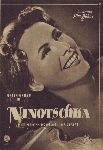
More HERE!
|
| QUOTES FROM THE FILM |
| Ninotchka: Must you flirt?
Count Leon d'Algout: Well, I don't have to, but I find it natural.
Ninotchka: Suppress it.
|
| AUDIO-FILE |
Go HERE!
|
| MOVIE STILLS |
|
The Stills were made during the production by William Grimes. 79 Movie Stills were shot.
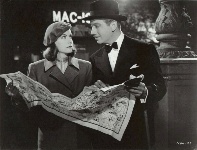 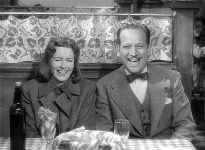 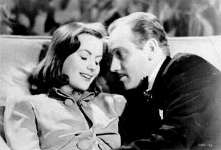
More HERE!
|
PRODUCTION |
|
Production Dates: June–August 1939
Production Location: USA
|
| FAN ART |

See more HERE!
|
PREMIERED/RELEASED |
Release Date in USA: October 6, 1939 (Hollywood, CA), November 9, 1939 (USA)
Premiere Date: November 10, 1939 (Radio City Music Hall in New York)
Release Date in Germany: 07.12.1948. – TV : 23.12.1971 (ARD)
|
| LOBBYCARDS |
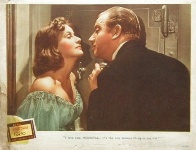
See HERE!
|
TRIVIA |
 Lubitsch himself was more than pleased with Ninotchka. “I wouldn't have done it if Garbo hadn't been cast for it. And without Garbo I don't think it would have meant a thing,” he said. Lubitsch himself was more than pleased with Ninotchka. “I wouldn't have done it if Garbo hadn't been cast for it. And without Garbo I don't think it would have meant a thing,” he said.
 MGM re-released the film in January 1948. MGM re-released the film in January 1948.
 Gary Cooper was also rumoured to play Garbo's leading man. Gary Cooper was also rumoured to play Garbo's leading man.
 Ninotchka was Garbo second film with Melvyn Douglas. Ninotchka was Garbo second film with Melvyn Douglas.
 It was her first American comedy role. It was her first American comedy role.
 She was nominated for an Academy Award for this performance. She was nominated for an Academy Award for this performance.
 According to published newspaper reports in the spring of 1939, Spencer Tracy was a leading contender for the role of Leon. William Powell, Robert Montgomery, Clark Gable and Cary Grant were also considered for the part. According to published newspaper reports in the spring of 1939, Spencer Tracy was a leading contender for the role of Leon. William Powell, Robert Montgomery, Clark Gable and Cary Grant were also considered for the part.
 The movie was banned in the Soviet Union. The movie was banned in the Soviet Union.
 $125,000 was Garbo's Salary. $125,000 was Garbo's Salary.
 Filmed in 56 days. Filmed in 56 days.
 The tagline "Garbo laughs!" came before the screenplay was written. The film was built around that single, now legendary, slogan. The tagline "Garbo laughs!" came before the screenplay was written. The film was built around that single, now legendary, slogan.
 The film had a worldwide re-release in 1952 & 1953 and made around 570.000 Dollar. The film had a worldwide re-release in 1952 & 1953 and made around 570.000 Dollar.
 Garbo had her misgivings about appearing in a comedy and was particularly nervous. Especially about the drunk scene, which she considered to be highly vulgar. Garbo had her misgivings about appearing in a comedy and was particularly nervous. Especially about the drunk scene, which she considered to be highly vulgar.
 Although Garbo's famous hat in the film was made by her regular costumier Adrian, it was actually based on a sketch by Garbo herself. Although Garbo's famous hat in the film was made by her regular costumier Adrian, it was actually based on a sketch by Garbo herself.
 An colorized version exists. This is her second colorized film after Camille. An colorized version exists. This is her second colorized film after Camille.
 Greta Garbo did not wear any makeup for her scenes where she is the stern envoy. Greta Garbo did not wear any makeup for her scenes where she is the stern envoy.
 Love is not a simple thing was the working title for Ninotchka. Love is not a simple thing was the working title for Ninotchka.
 In early 1938, MGM announced Garbo's next two films. They published that she will do Madame Curie and Love is not so simple for the 1938/39 season. In early 1938, MGM announced Garbo's next two films. They published that she will do Madame Curie and Love is not so simple for the 1938/39 season.
 Greta Garbo did not wear any makeup for her scenes where she is the stern envoy. Greta Garbo did not wear any makeup for her scenes where she is the stern envoy.
 This film was selected to the National Film Registry, Library of Congress, in 1990. This film was selected to the National Film Registry, Library of Congress, in 1990.
 Garbo had her misgivings about appearing in a comedy and was particularly nervous about the drunk scene, which she considered to be highly vulgar.
The movie was banned in the Soviet Union and its satellite states. Garbo had her misgivings about appearing in a comedy and was particularly nervous about the drunk scene, which she considered to be highly vulgar.
The movie was banned in the Soviet Union and its satellite states.
 Curiously enough, this was the very movie Arnold Schwarzenegger studied when he was trying to find his character for Red Heat (1988). The exercise - emulate Garbo - was recommended to him by his director Walter Hill. Curiously enough, this was the very movie Arnold Schwarzenegger studied when he was trying to find his character for Red Heat (1988). The exercise - emulate Garbo - was recommended to him by his director Walter Hill.
 Ernst Lubitsch only signed on as director after George Cukor decamped for Gone with the Wind (1939). As part of his deal for directing, MGM agreed to make The Shop Around the Corner (1940) for Lubitsch afterwards. Ernst Lubitsch only signed on as director after George Cukor decamped for Gone with the Wind (1939). As part of his deal for directing, MGM agreed to make The Shop Around the Corner (1940) for Lubitsch afterwards.
 Lubitsch disliked Gottfried Reinhardt' and S.N. Behrman's original screenplay, so he commissioned a rewrite from Billy Wilder, Charles Brackett and Walter Reisch. Lubitsch disliked Gottfried Reinhardt' and S.N. Behrman's original screenplay, so he commissioned a rewrite from Billy Wilder, Charles Brackett and Walter Reisch.
 Lubitsch himself made some significant uncredited contributions to the screenplay. Lubitsch himself made some significant uncredited contributions to the screenplay.
 Although Garbo's famous hat in the film was made by her regular costumier Adrian, it was actually based on a sketch by Garbo herself. Although Garbo's famous hat in the film was made by her regular costumier Adrian, it was actually based on a sketch by Garbo herself.
 On February 8, 1939, Lubitsch started work at MGM but due of several reasons the director was beginning to lose interest. Ninotchka took a new course and it appeared that William Wyler would direct it, with Cary Grant starring opposite Garbo in a script by Ben Hecht and Charles MacArthur. Garbo visited a very nervous Cary Grant, and then vetoed the idea. On February 8, 1939, Lubitsch started work at MGM but due of several reasons the director was beginning to lose interest. Ninotchka took a new course and it appeared that William Wyler would direct it, with Cary Grant starring opposite Garbo in a script by Ben Hecht and Charles MacArthur. Garbo visited a very nervous Cary Grant, and then vetoed the idea.
 Garbo didn't want to play the nightclub scene in which she would have to get tipsy on champagne. “I don't think that I can play it,” she said. “Look here,” said Lubitsch firmly. “I'll do anything you want. I'll change the script. I'll change the dialogue. But this can't be changed. Too much depends on it. You must make up your mind that you have to play it.” Garbo reluctantly agreed and left the studio, but the unresolved problem added to her anxiety about appearing on film for the first time in two years. Garbo didn't want to play the nightclub scene in which she would have to get tipsy on champagne. “I don't think that I can play it,” she said. “Look here,” said Lubitsch firmly. “I'll do anything you want. I'll change the script. I'll change the dialogue. But this can't be changed. Too much depends on it. You must make up your mind that you have to play it.” Garbo reluctantly agreed and left the studio, but the unresolved problem added to her anxiety about appearing on film for the first time in two years.
 A rumor is that Garbo's famous laugh was dubbed but that is not true. During filming, Garbo laughed quite heartily and uproariously but emitted no sound. The star was unable to articulate so much as a titter. The sound department solved the problem in the final mix by raising the volume of the laughter of the people around her. A rumor is that Garbo's famous laugh was dubbed but that is not true. During filming, Garbo laughed quite heartily and uproariously but emitted no sound. The star was unable to articulate so much as a titter. The sound department solved the problem in the final mix by raising the volume of the laughter of the people around her.
|
| SCRIPTED BUT NOT FILMED |
Double meaning dialogue for Garbo |
Garbo had an objection to the script. She didn't like a line in which Ninotchka states that the hard wooden thirdclass benches in the train should be upholstered. “We communists will change this from the bottom up,” she declares. Sitting in her car with Lubitsch, Garbo argued that the line was vulgar and insisted that it be changed, because she was not going to say it. Lubitsch changed the dialogue and the scene was never filmed.
Double meaning dialogue at the party scene |
This dialogue was also scripted but not filmed: “I held my breath,” says a character in a party scene. “And then I felt the husband fumbling for his slippers. I pushed them from under the bed–toward him–and what do you think he said? Aren't these slippers marvelous? I go away for a ten-day trip, and when I come back, they're just as warm as when I left them.”
|
BACKGROUND STORY |
What's next for Garbo? |
Garbo was desperate to make a modern film comedy. Her last film, Conquest (MGM 1937) was not a commercial success. Garbo was also just branded with the infamous box-office poison advertisement. The star made a one-year break from making movies and went to Europe . Before she returned, many asked: “What's next for Garbo?” Garbo was the most celebrated star in the world. Her potential as an actor was unrealized. The studio had all the resources necessary to launch a major comeback for her.
How the ‘Ninotchka' was born |
Many projects had been suggested and considered for Garbo's return to Hollywood but what the star most needed was a new image for her ‘comeback'. A repackage of her old formula. There was every reason to try. One day in mid-1937, Garbo's best friend, Salka Viertel asked Hungarian writer Melchior Lengyel if he had a story for Garbo that could be advertised with the slogan ‘Garbo Laughs'.
Lengyel was pleased to be asked. He looked into his notebooks and came across an idea he had some years ago. The writer called Viertel and a meeting with Garbo was arranged. He met the star, opened his notebook and read aloud : “Russian girl saturated with Bolshevist ideals goes to Paris . She meets romance and has an uproarious good time. Capitalism not so bad after all.” Garbo listened to his ideas and then laughed out loud. “I like i. “I will do it.” Within a week, Lengyel had collected $15,000 for his idea.
Marie Curie or Ninotchka |
The MGM producers liked the story and thought it might work but they still wanted to have more than one project to offer Garbo. Viertel who was not officially involved in writing Ninotchka , wanted to push Garbo and MGM to do a on the life of Marie Curie. Garbo liked the idea and Salka kept on working on the script but MGM producers were not really convinced and decided to shelve Marie Curie. They rather would like to produce a comedy for Garbo.
In late 1938, Garbo returned from Europe to work on her next film. As soon as Garbo arrived in Hollywood , other possible projects were discussed. Nothing turned out. S. N. Behrman (who was assigned to work on the Ninotchka script) had finished his work on re-writing the Lengyel's story. The script got green light and Garbo signed a contract for a new film.
The director |
Garbo was disappointed to hear that Cukor was not available and the studio suggested her Edmund Goulding. Garbo always wanted to work with G erman-born film director Ernst Lubitsch and MGM just signed a two-picture deal with him and his first would be Ninotchka.
On February 8, 1939, Lubitsch started work at MGM but he did not like the Behrman script and he brought in screenwriter Walter Reisch. Lubitsch next wanted to meet with Garbo but she would not consent to meet Lubitsch at the studio or at his home. Lubitsch was beginning to lose interest. After new directors had been considered Lubitsch still wanted to do the film.
After some time he finally won her over. They met and discussed the film. After some more meetings, Garbo gave okay to do the movie and the director and his three writers worked on the script. As Garbo's partner, Lubitsch had cast Melvyn Douglas, with whom he enjoyed working on Angel ( Paramount 1937) with Marlene Dietrich. In June 1939, Garbo was back in front of a camera, the first time since two years. Garbo was in good mood and wanted to start filming.
Garbo laughs |
Lubitsch said that the reason he wanted to make this picture was that he thought Garbo was really funny. Friends said that Garbo changed a lot while making this picture and laughed more then before.
Lubitsch thought that Garbo did extremely well in the restaurant scene where Ninotchka laughs for the first time. The scene had caused some anxiety, since the film would be sold with the phrase “Garbo Laughs!”.
Garbo didn't want to play the nightclub scene in which she would have to get tipsy on champagne. So the scene was filmed toward the end of the shooting. When they finally did get to it she was very timid. But finally the director got her to relax completely by talking to her and being patient.
Filming ended |
Filming ended on July 28, and news began to spread that Garbo and Lubitsch had made a superlative movie. In late September, MGM held a preview of Ninotchka. Garbo arrived at the theater in Long Beach . This was her first preview since Camille, and Garbo was very excited. As the film played, it became obvious that people were really enjoying it.
After the film, Lubitsch was tremendously curious about Garbo's reaction. “Do you like yourself in it?” he asked. Her answer was surprising. “She didn't know if she was bad or good.”
Ninotchka premiered on October 26, 1939 at Grauman's Chinese Theatre, and two weeks later in New York and got amazing reviews. On November 22, a New York Times item reported that 300,000 people had seen Ninotchka in its first two weeks at the Music Hall.
The film had done very well, grossing $1.187 million domestically and, even without Europe , $1.092 million overseas. It was nominated for a Best Picture Academy Award, and Garbo received her fourth Best Actress nomination. This classic movie proved that she was still a star of the first magnitude, loved by her fans and revered by critics. But Garbo was not happy. After the film Garbo passed her time in solitude, not knowing or caring if MGM was looking for her next vehicle.
|
| SIMILAR FILMS |
 Tovarich (the Russian word for comrade) is a 1937 Warner Bros. comedy film based on the 1935 play by Robert E. Sherwood. It was produced and directed by Anatole Litvak with Robert Lord as associate producer and Hal B. Wallis and Jack L. Warner as executive producers. Tovarich (the Russian word for comrade) is a 1937 Warner Bros. comedy film based on the 1935 play by Robert E. Sherwood. It was produced and directed by Anatole Litvak with Robert Lord as associate producer and Hal B. Wallis and Jack L. Warner as executive producers.
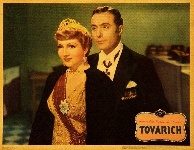
Claudette Colbert and Charles Boyer in Tovarich
|
| BUSINESS DATA |
| Budget: 1.365.000 Dollar
Gross: USA: 1.187.000 Dollar; Non-USA: 1.092.000 Dollar; World: 2.279.000 Dollar
Profit: 138.000 Dollar.
Garbo's Salary: $125,000
|
| PORTRAITS |
Clarence Sinclair Bull made the portraits of Garbo for the film. He made two sessions, the first between May–early June 1939, and the second on August 9, 1939 (costume studies).
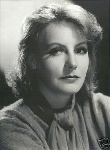 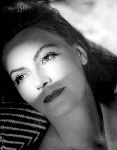 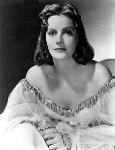 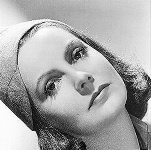
More HERE!
|
| REVIEWS |
| |
Howard Barnes for New York Herald Tribune:
|
Now that she has done it, it seems incredible that Greta Garbo never apeared in a comedy before Ninotchka. For in this gay burlesque of Bolsheviks abroad, the great actress reveals a command of comic inflection which fully matches the emotional depth or tragic power of her earlier triumphs. It is a joyous, subtly shaded and utterly enchanting portrayal which she creates, to illuminate a rather slight satire and make it the year's most captivating screen comedy.
Ernst Lubitsch has put his famous directorial touch on the film and it is leavened with witty lines and deft characterizations, but it is memorable as well as entertaining for having disclosed new gifts in the First Actress of our day. To see Garbo playing a grim comrade who deviates from party doctrine on a mission to Paris, turns square briefly, and then goes overboard for romance, one would suppose that she had devoted her whole career to antic make-believe.
Whether it is deadpan clowning or the difficult feat of filling a tipsy scene with laughter; whether she is trading insults with a Grand Duchess or secretly trying on one of those current hats, she is a past mistress of comedy. Meanwhile, she floods the production with her timeless and ineffable beauty, giving a rich and haunting quality to the romantic scenes and a moving intensity to the few passages of straight drama. There is an added verve and color to her personality in a role such as this which makes her even more magically lovely than in the past.
|
Frank S. Nugent for New York Times: |
Garbo's Ninotchka is one of the sprightliest comedies of the year, a gay and impertinent and malicious show which never pulls the punch lines (no matter how far below the belt they may land) and finds the screen's austere first lady of drama playing in deadpan comedy with the assurance of a Buster Keaton....
It must be monotonous, this superb rightness of Garbo's playing. We almost wish she would handle a scene badly once in a while just to provide us with an opportunity to show we are not a member of a fan club. But she remains infallible and Garbo, always exactly what the situation demands, always as fine as her script and director permit her to be.
|
| STAGE PLAYS |
 Silk Stockings is a musical with a book by George S. Kaufman, Leueen MacGrath, and Abe Burrows and music and lyrics by Cole Porter. Loosely based on the Melchior Lengyel story Ninotchka and the 1939 film adaptation it inspired. It premiered in 1955 on Braodway, starring Hilgegard (Neff) Knef. Silk Stockings is a musical with a book by George S. Kaufman, Leueen MacGrath, and Abe Burrows and music and lyrics by Cole Porter. Loosely based on the Melchior Lengyel story Ninotchka and the 1939 film adaptation it inspired. It premiered in 1955 on Braodway, starring Hilgegard (Neff) Knef.

Original Broadway production with Knef in the arms of Ameche.
 Ninotchka - The theatrical Version, was the title of an Italian stage production which premiered in 2001. Ninotchka - The theatrical Version, was the title of an Italian stage production which premiered in 2001.
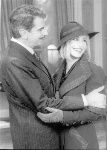
Claudia Koll starred in the Italian theatrical version of Ninotchka
|
STORY FROM THE FILM-SET - Part I |
Garbo was on a diet when she met director Lubitsch to talk about the film. Lubitsch had ordered an immense meal. “I never touch lunch,” said Garbo brusquely. “All right,” smiled Lubitsch. “I will eat and you listen.” At that point, said Reisch, Lubitsch became a character in one of his own sequences.
He started telling Garbo the story. He got more excited with each line, and forgot the food. An hour later, when he had finished talking, he looked at the table–it was cleaned out. Garbo had been so carried away by his enthusiasm that she had forgotten her diet and put away the whole meal.
|
STORY FROM THE FILM-SET - Part II |
Garbo was sitting tensely on the leather sofa in Lubitsch's office. His black eyebrows knit tightly. “Can you laugh?” he asked her with the utmost seriousness. “I think so,” Garbo answered. “Do you often laugh?” “Not often,” Garbo answered quietly. “Could you laugh right now?” “Let me come back tomorrow,” Garbo said after a thought-filled pause.
Garbo returned to Lubitsch's office the next day and sat forward on the sofa. “All right,” she said. “I'm ready to laugh.” “Go ahead,” said Lubitsch. “And she laughed and it was beautiful,” Lubitsch recalled. “And she made me laugh! And there we sat in my office like two loonies, laughing for about ten minutes. From that moment on, I knew I had a picture with her.”
|
|
ALTERNATE SCENES |
Scenes with different costumes
|
In Ninotchka, three scenes were changed in the course of shooting. They involved changes in Garbo's wardrobe, which looked drab in the rushes. She was given a stylish Russian blouse for the retake of her first scene in Leon 's apartment, and a luxuriant off-the-shoulder evening gown made of white tulle for the nightclub scene, which was first shot with a high-necked crepe dress.
Ina Claire had stolen some scenes |
Filming ended on July 28 but the late-August preview was a little worrisome because Garbo's female co-star Ina Claire had stolen some scenes. So Lubitsch cut two of Ina Claire's scenes and then brought her back to shoot transitional material. It is not known if thsoe scenes still excist.
|
REMAKES |
 Silk Stockings is a 1957 MGM musical film remake of Ninotchka. It was directed by Rouben Mamoulian and starred Fred Astaire and Cyd Charisse. The supporting cast included Janis Paige, Peter Lorre, Jules Munshin, and George Tobias
repeating his Broadway role. Silk Stockings is a 1957 MGM musical film remake of Ninotchka. It was directed by Rouben Mamoulian and starred Fred Astaire and Cyd Charisse. The supporting cast included Janis Paige, Peter Lorre, Jules Munshin, and George Tobias
repeating his Broadway role.

DVD cover
 Ninotchka - TV version I, in 1960 German actress Maria Schell starred in an American TV production of the classic Garbo film. Ninotchka - TV version I, in 1960 German actress Maria Schell starred in an American TV production of the classic Garbo film.
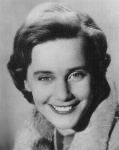
Maria Schell
 Ninotchka - TV version II, in 1965 German actress Ruth Leuwerik starred in a German TV production of the classic Garbo film. Ninotchka - TV version II, in 1965 German actress Ruth Leuwerik starred in a German TV production of the classic Garbo film.
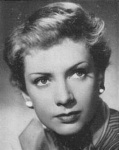
Ruth Leuwerik
 Auch Ninotschka zieht ihr Höschen aus (English: Even Ninotchka takes off her panties), is 1973 produced 'softsex' film. The title and even the lead character is inspired by Garbo and the classic movie. The Spanis title is Las Calientes Bolcheviques. Auch Ninotschka zieht ihr Höschen aus (English: Even Ninotchka takes off her panties), is 1973 produced 'softsex' film. The title and even the lead character is inspired by Garbo and the classic movie. The Spanis title is Las Calientes Bolcheviques.
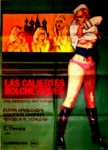
Spanish poster art |
| NINOTCHKA II |
After the huge success with Ninotchka; MGM wanted to re-team Garbo & Lubitsch. The director, writer & producers had several ideas for new Garbo films and wanted to offer them to Greta but he couldn't reach Greta on the phone. Garbo had wanted to work with Lubitsch for ten years, had socialized with him, had respected him.
Why would she refuse his calls? Salka Viertel said that Garbo had not really been happy on the set with Ernst and that there was no “ Stimmung”. He never talked to Greta about his other film ideas and unfortunately none of them are known.
More HERE!
|
| COLORIZED VERSION |
Colorization is a computerized process that adds color to a black & white movie or TV program. Camille and Ninotchka were also part of the film colorization during the mid - late 1980s. It was premiered on American TV in autumn 1990 and never aired again. Many Classics, like King Kong or Casablanca, were colorized by Time Warner Media Mogul Ted Turner.
This was to allow black and white films to have new audiences of people who were not used to the format but the process drew considerable controversy. Garbo's colorized Camille was released on home video as a very limited release in 1990.
|
| PICTURES FROM THE COLORIZED VERSION |
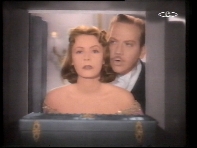 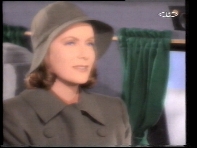 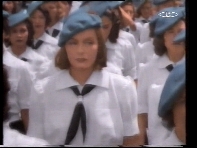 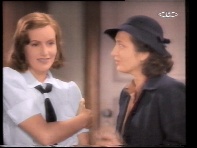
See HERE!
|
| WORKING TITLES |
They want to be Alone
Love is not so simple
We want to be alone!
Ninotchka: Love Is Not So Simple
|
| AD CAMPAIGN SLOGANS |
|
Garbo Laughs!
|
DVD/VHS |
Available on DVD & VHS.
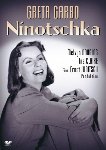
See HERE!
|
| |
SOURCE |
|
| |
Greta Garbo: A Cinematic Legacy – by Mark A. Vieira
(Harry N. Abrams, Incorporated, New York 2005).
This is the best and most accurate book
about Garbo's-Films.
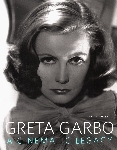
|
|
| |
OTHER SOURCES |
|

|
Karen Swenson – A life Apart
Barry Paris – Garbo
IMDB – International Movie Database
plus many other books, magazines and internet sites. |
|

